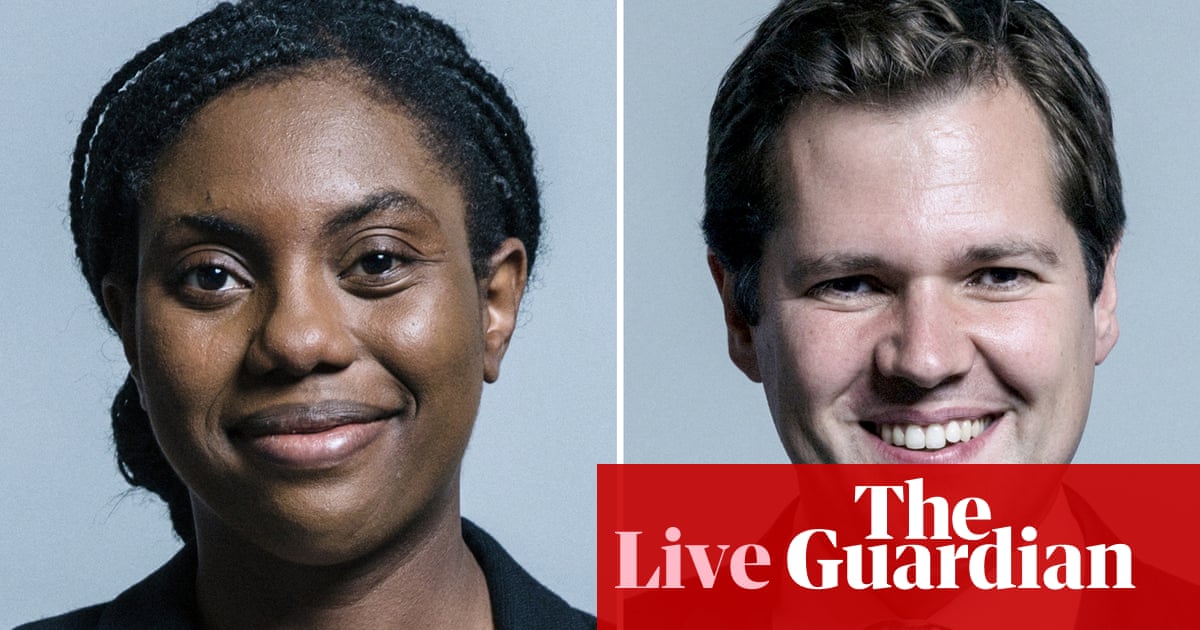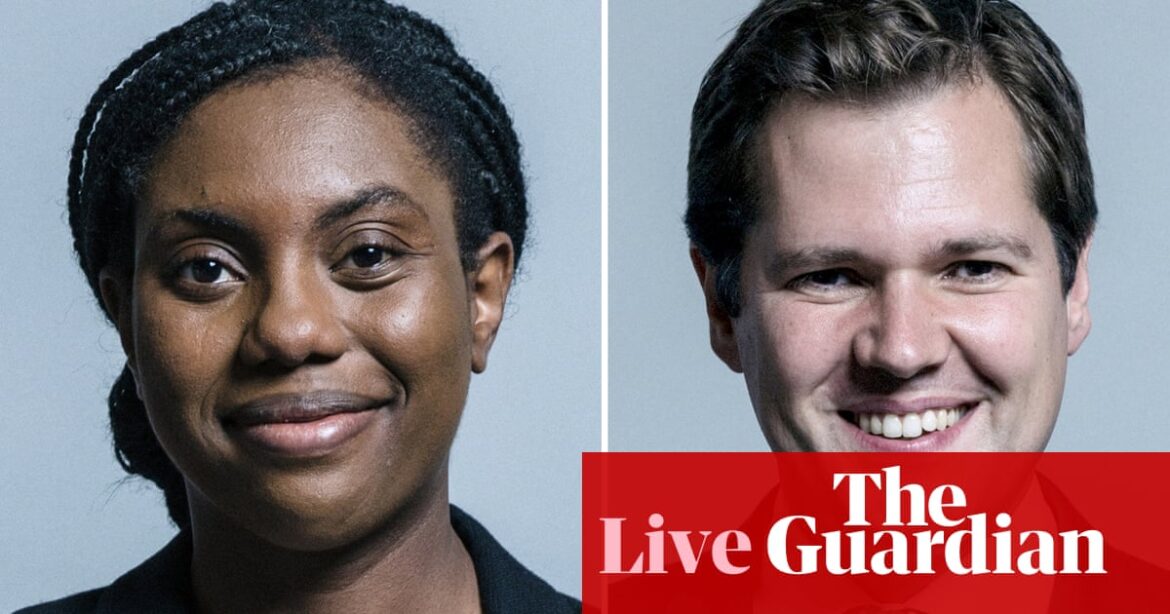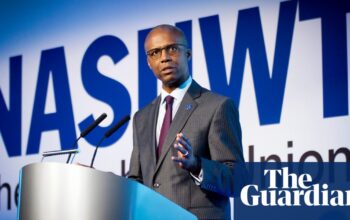
In a statement, the TRG says Jenrick and Badenoch have both “used rhetoric and focused on issues which are far and away from the party at its best”. It says:
The Tory Reform Group (TRG) will not be endorsing a candidate in this year’s Conservative leadership contest.
As the home of One Nation Conservatism since 1975, the TRG is committed to being radically moderate, values-driven, and focused on the future. Throughout the contest, we have sought to engage extensively with all the leadership campaigns in order to understand the views and approaches of the candidates. Unfortunately, we have been consistently disappointed by the lack of engagement from the two candidates chosen by MPs.
TRG members were consulted throughout the process, and the results clearly show that neither candidate has secured widespread support from the majority of our membership. Both have used rhetoric and focused on issues which are far and away from the party at its best, let alone the One Nation values we cherish and uphold. Therefore, the board of the TRG has unanimously concluded that we are unable to endorse either candidate.
The TRG lists Ken Clarke, the former chancellor, as its president, and Damian Green, a former first secretary of state, and Robert Buckland, a former justice secretary, as vice presidents. It was set up in the 1970s and for many years it was a respected liberal/leftish voice in Tory circles. But, as the party lurched to the right after Brexit, its influence has shrunk.
Robert Jenrick are the only two candidates left in the current leadership contest and the winner should benefit from the change, which will affect the number of MPs needed to demand a vote of confidence in the leader.
Under the current system, a vote takes place if 15% of Tory MPs submit a letter to the chair of the 1922 Committee demanding one. MPs are allowed to do this anonymously.
When the Tories were in government, that meant around 50 MPs or more had to want a vote for one to happen. But now there are only 121 Conservative MPs meaning that, without a rule change, just 19 MPs would be enough to trigger a contest.
In an interview with GB News, Bob Blackman, the chair of the 1922 Committee said the threshold for a no confidence vote would be lifted, probably to 30% or more. He said:
Now we will amend those rules to increase the threshold. I am not going to say what it is going to be but I suspect it will be at least to 30%, to enable a position where there will have to be a very strong opinion of the parliamentary party.
A 30% threshold would mean at least 37 Tories would need to write to Blackman to trigger a contest.
The ability of Tory MPs to demand a no confidence vote has been a destabilising factor in the party in recent years. Theresa May and Boris Johnson were both subject to no confidence votes; they both won, but they both ended up resigning not long afterwards anyway.
Even with a change to the rules, the next Tory leader is likely to feel vulnerable because Badenoch and Jenrick each had the support of just over a third of MPs in yesterday’s final parliamentary ballot. They are both in the position of knowing there are more Tory MPs who don’t want them as leader than who do.
Labour leaders are in a stronger position. Jeremy Corbyn lost a no confidence vote by a huge margin when he was leader in 2016. But he argued that party rules did not require him to stand down, because he had a mandate from members, and, even though a new leadership election was triggered, he won it easily.
told the Sun in an interview that this was because Emmanuel Macron, the French president, was determined not to help Britain.
Jenrick said:
What was shameful about that incident was that, as I understand it, Rishi Sunak put it to President Macron, and he rejected it. He wouldn’t even give it a hearing, because he didn’t want to fix this problem, probably as a punishment for Brexit …
The French could stop this tomorrow … but what I learned is you cannot rely on the French.
Kemi Badenoch’s campaign team is arguing that the leak shows Jenrick is not fully committed to a hardline immigration policy. A Badenoch campaign source told the Sun:
Jenrick claims that he was radicalised in the Home Office.
But this shows that a few months before he flounced out of government he was proposing to swap migrants with France, which would have done nothing to reduce overall numbers, and casting doubt on the Rwanda scheme, which would have provided an effective deterrent.
Rob’s late conversion to hardline immigration policies isn’t fooling anyone.
assisted dying for terminally ill adults bill he introduced in the Lords. He says that is because the Labour MP Kim Leadbeater is going to introduce her own private member’s bill in the Commons and a date has now been set for its second reading. (See 11.26am.) He posted this on social media.
Kim Leadbeater’s Assisted Dying Bill has now got a date, 29/11, for its 2nd Reading in the Commons. I will, therefore, not proceed with my Bill in the Lords.
Lucy Powell, the leader of the Commons, told MPs this morning that the first private member’s bill debate will take place on 29 November. She did not confirm that Leadbeater’s bill will definitely be debated then, but Leadbeater came top in the ballot for private member’s bills and so the slot should be hers.
11.18am and 2.18pm.)
Siva Anandaciva, chief analyst at the King’s Fund charity, said:
The NHS is approaching winter in bad shape.
Industrial action is continuing, financial pressures are rising, and important performance targets continue to be missed.
Despite the hard work of staff, patient care in the NHS continues to fall short of expectations.
Today’s statistics show it has been three years since A&E performance was above the current temporary target of 78% of people waiting under four hours and nearly a decade since the official target of 95% of people being seen in four hours was met.
It has been four years since the 18-minute target for the average ambulance response time to conditions such as strokes and heart attacks was met …
While sticking plasters are not the solution to the crises facing the NHS, without an injection of more resources to get through the next few months and seeds of hope for the coming year, NHS services will have to make harsh trade-offs between immediate winter preparations and longer-term improvement.”
Dr Tim Cooksley, a past president of the Society for Acute Medicine, said the A&E 12-hour waits were “up more than 20% on last year at 38,880 patients”. He added:
This is a dire situation for the patients who are left receiving degrading corridor care and for staff who are stretched to their limits and are having to provide care in inappropriate environments.
Tim Gardner, assistant director of policy at the Health Foundation, said:
We estimate an additional £38bn is needed to significantly improve the NHS and tackle long waits by the end of this parliament. The upcoming budget is a crucial opportunity for the government to start showing how it intends to turn its ambitions into reality.
And the Royal College of Surgeons also called for extra money for the NHS in the budget. Its vice president Professor Frank Smith said:
If the new government wants to show it is serious about meeting its pledge to cut waiting times, it must provide capital funding for NHS buildings and IT in the autumn budget later this month.
With reports of broken lifts and flooded corridors in hospitals leading to cancelled operations, and surgeons telling us access to operating theatres remains an issue, cutting waits will remain an uphill battle without this investment.
a statement saying it is refusing to back either of the two candidates left in the leadership contest – Robert Jenrick and Kemi Badenoch.
In a statement, the TRG says Jenrick and Badenoch have both “used rhetoric and focused on issues which are far and away from the party at its best”. It says:
The Tory Reform Group (TRG) will not be endorsing a candidate in this year’s Conservative leadership contest.
As the home of One Nation Conservatism since 1975, the TRG is committed to being radically moderate, values-driven, and focused on the future. Throughout the contest, we have sought to engage extensively with all the leadership campaigns in order to understand the views and approaches of the candidates. Unfortunately, we have been consistently disappointed by the lack of engagement from the two candidates chosen by MPs.
TRG members were consulted throughout the process, and the results clearly show that neither candidate has secured widespread support from the majority of our membership. Both have used rhetoric and focused on issues which are far and away from the party at its best, let alone the One Nation values we cherish and uphold. Therefore, the board of the TRG has unanimously concluded that we are unable to endorse either candidate.
The TRG lists Ken Clarke, the former chancellor, as its president, and Damian Green, a former first secretary of state, and Robert Buckland, a former justice secretary, as vice presidents. It was set up in the 1970s and for many years it was a respected liberal/leftish voice in Tory circles. But, as the party lurched to the right after Brexit, its influence has shrunk.
11.18am.)
Here are some of the other lines from the NHS England performance figures. The copy is all from PA Media.
On many indicators, performance is getting worse.
Ambulance response times
-
The average response time in September for ambulances in England dealing with the most urgent incidents, defined as calls from people with life-threatening illnesses or injuries, was eight minutes and 25 seconds, PA says. This is up from eight minutes and three seconds in August and is above the target standard response time of seven minutes.
-
Ambulances took an average of 36 minutes and two seconds last month to respond to emergency calls such as heart attacks, strokes and sepsis, PA says. This is up from 27 minutes and 25 seconds in August, while the target is 18 minutes.
-
Response times for urgent calls, such as late stages of labour, non-severe burns and diabetes, averaged two hours, 12 minutes and 54 seconds in September, up from one hour, 30 minutes and 33 seconds in August, PA says.
A&E waiting times
-
The number of people waiting more than 12 hours in A&E departments in England from a decision to admit to actually being admitted stood at 38,880 in September, up from 28,494 in August, PA says. The record high for a calendar month is 54,573, which occurred in December 2022.
-
The number waiting at least four hours from the decision to admit to admission also rose, standing at 130,632 in September, up from 116,489 in August, PA says.
-
Some 74.2% of patients in England were seen within four hours in A&Es last month, down from 76.3% in August, PA says. The NHS recovery plan set a target of March this year for 76% of patients attending A&E to be admitted, transferred or discharged within four hours.A further target of 78% has been set for March 2025.
Cancer waiting times
-
Some 75.5% of patients in England urgently referred for suspected cancer in August were diagnosed or had cancer ruled out within 28 days, PA says. This is down from 76.2% the previous month but is above the target of 75%. It is the fourth month in a row this target has been exceeded.
-
GPs in England made 253,841 urgent cancer referrals in August, down from 286,720 in July and also down year-on-year from 268,224 in August 2022, PA says.
-
The proportion of patients in England who had waited no longer than 62 days in August from an urgent suspected cancer referral or consultant upgrade to their first definitive treatment for cancer was 69.2%, up from 67.7% in July, PA says. The target is 85%.
Long waits for treatment
-
A total of 282,664 people in England had been waiting more than 52 weeks to start routine hospital treatment at the end of August, down from 290,326 at the end of July and the lowest number since December 2020, PA says. The previous government and NHS England set the ambition of eliminating all waits of more than a year by March 2025.
-
Some 3,335 patients in England had been waiting more than 18 months to start routine treatment at the end of August, up from 2,738 in July, PA says. The previous government and NHS England set the ambition of eliminating all waits of more than 18 months by April 2023, excluding exceptionally complex cases or patients who choose to wait longer.
-
There were 45,527 patients who had been waiting more than 65 weeks to start treatment at the end of August, down from 50,860 in July, PA says. The target to eliminate all waits of more than 65 weeks is September 2024.
Unite had accepted the pay deal, but Unison was breaking ranks. There was “absolutely no justification” for his constituency to be targeted. He said:
A pay deal has been offered by local government – the [Scottish] government is not even the employer here; a pay deal has been offered by the employers, which has been accepted by two out of the three trade unions …
[So] for that to be accepted by two unions and rejected by a third, and then for my constituents to be singled out for treatment just because their MSP happens to be the first minister, I think, is absolutely unacceptable.
He urged both sides to resume talks, but said there was no further money available from ministers. Financing the pay deal had played a part in forcing his government to impose £500m in spending cuts to fund it, he said.
And that deal was higher than the pay settlement with English council staff, while Scotland’s local authorities had pledged to work towards a £15 an hour pay rate in future, he added.
Mark Rutte have said that Storm Shadow missiles alone will not allow Ukraine to win its war against Russia
Keir Starmer and Mark Rutte, the Nato secretary general, met Volodymyr Zelenskyy, the Ukrainian president, in Downing Street today to be updated on Ukraine’s “victory plan”.
Zelenskyy has been lobbying for months for permission to use the missiles, which have been supplied by Britain and France, to hit military sites in Russia. Washington needs to approve the move too because the missiles would need to use a US missile guidance system to avoid Russian jamming.
But today No 10 and Rutte both insisted that it would take more than one missile system to win the war.
At the Downing Street lobby briefing, the PM’s spokesperson played down the significance of the Storm Shadow, in a hint that no change of policy is imminent. The spokesperson said:
No war had ever been won by a single weapon.
The discussions that the UK, Ukraine and international partners are having are about all the range of support that we can provide Ukraine heading into the crucial winter months ahead.
Speaking after talks in No 10, Zelenskyy said:
The victory plan aims to create the right conditions for a just end to the war.
I thank the United Kingdom for its continued defence support of our country, including with long-range weapons.
In his own comments to reporters, Rutte said there was not legal reason why Ukraine could not use Storm Shadow missiles against Russia in self-defence. Asked about Ukraine being allowed to use them, he said:
First of all, that is up to the allies, the individual allies, to decide how weapons they deliver into Ukraine can be used.
Legally that is possible because legally Ukraine is allowed to use its weapons, if they can hit targets in Russia, if these targets present a threat to Ukraine.
But whether individual allies do, that’s in the end, [is] always up to individual allies. Of course we discussed this. I was last week in Kyiv. We discussed it today, but in the end, it is up to the individual allies.
Asked if he sympathised with Ukraine’s complaints that it is having to fight with its hands tied behind its back as a result of the restrictions, Rutte said:
Well, I think it is a bit more nuanced, because when you look at what the UK is doing, I think it is now £3bn a year you guys are providing Ukraine with this military aid, with training.
He went on:
The whole of the alliance is in this, and let’s not focus on one system, one weapon system, it will not be one weapon system which will make the change.
So I understand what Zelenskyy is asking, but at the same time, he also agrees that there is a broader issue to be debated to make sure that they prevail.
‘yellow card rule’ which means they are not supposed to engage in personal attacks against each other, and when Robert Jenrick was invited to criticise Kemi Badenoch directly in his Q&A with journalists, he didn’t take the bait. (See 12.27pm.)
But in his speech he said that if members voted for him as leader, they would avoid “needless drama” – which did seem to be a clear dig at Badenoch, and her appetite for fueding and being provocative, particularly with the media. He also said the Tories should not be fighting battles on Twitter – another Badenoch speciality.
He said:
The public need to see that we are laser-focused on what they really care about, not getting drawn down rabbit holes.
The Conservative party is the oldest, most successful political party in the world. We exist to serve our country in government, not to do battle on Twitter.
Despite everything, our party remains our country’s best hope. We are the voice of the silent majority, the voice of hard working people across the United Kingdom. Their values are our values. Their priorities are our priorities. They expect us to deliver on them, to develop serious policy solutions, to express them soberly and coherently, and then to get on and put them into effect …
So my plan, grow the economy, reform our public services like the NHS, get migration done by capping the numbers and leaving the ECHR – a serious plan, not needless drama.
on the parliamentary website.Robert Jenrick speech, and Q&A, shortly. But here are assessments from two Guardian colleagues on social media.
Peter Walker, is is writing the news story, says:
Robert Jenrick starts his speech by saying it’s “great to be in the final two” – sounding almost like he can’t 100% believe it still. And it’s fair to say that on Tuesday evening, Team Jenrick had major worries.
For those who saw Jenrick’s Tory conference events, the start of his speech is very familiar. All about migration, the ECHR and “activist judges”. He is very clearly presenting himself as the candidate to take on Reform on their own turf.
And John Crace, our sketch writer, says:
This Robert Jenrick speech is one of the least inspiring I have ever heard. He has the charisma of a snail
Kemi Badenoch is ahead with the members. What do you have that she doesn’t?
Jenrick says he thinks he has consistently focused on the issues that matter to people – the NHS, immigration and the economy.
(This implies he thinks Badenoch hasn’t, but he does not say that.)
Q: Do you think you could be in the final two by mistake?
Jenrick says there is always horse trading in these contests. But he says he thinks Tory MPs voted for “the best placed people to lead this party forward”.
UPDATE: Jenrick said:
There [is] always horse trading in these things but I think, in the privacy of the ballot box, my colleagues in parliament chose who they thought were the best placed people to lead this party forward, and I’m immensely grateful for the trust and the confidence that they put in me.
Source: theguardian.com



